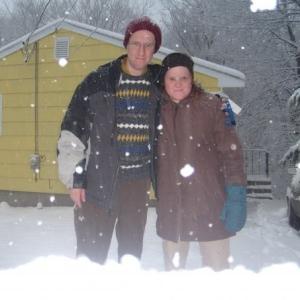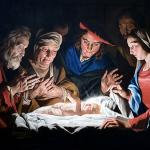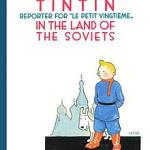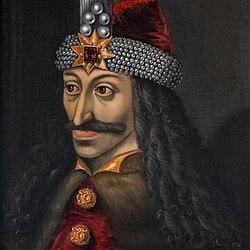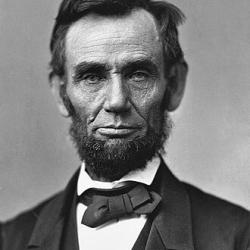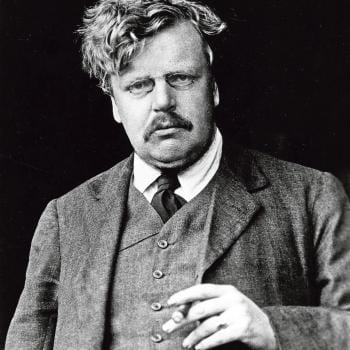Since the beginning of his pontificate Pope Francis always leads his flock into the new year with some profound thoughts on the reality of Christ and says some pithy things about the blessed mother. His Christology is very deep and timeless and worth reading and contemplating. If you doubt this, all you need to do is read his words as he contemplates the end of the year as we move on to the next one.
So lets be
Rocking in the New Year With Pope Francis
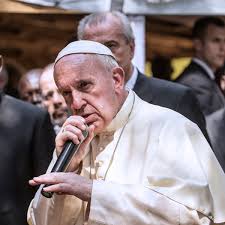
2013
The Apostle John describes the present time in a precise way:
“It is the last hour” (1 Jn 2:18).
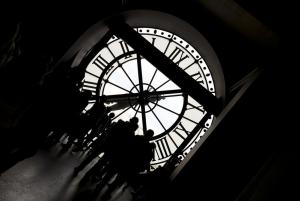
This statement — which recurs in the Mass of 31 December — means that with God’s coming into history we are already in the “last” times, after which the final phase will be of the second and definitive Coming of Christ.
The biblical and Christian vision of time and history is not cyclical but linear: it is a journey that moves toward completion. A year which has passed, then, does not lead us to a reality which ends but to a reality which is being fulfilled, it is a further step toward the destination that awaits us: a destination of hope and a destination of happiness, for we shall encounter God, who is the reason for our hope and the source of our happiness.
As 2013 draws to a close, we gather up, as in a basket, the days, weeks and months we have lived in order to offer them all to the Lord. And let us courageously ask ourselves: how have we lived the time which He has given us? Have we used it primarily for ourselves, for our own interests, or have we also sought to spend it on others? How much time have we reserved for being with God, in prayer, in silence, in adoration? 31 December 2013: Vespers and Te Deum | Francis
2014
In the Reading of these First Vespers, the Apostle Paul recapitulates the fundamental motive for our rendering thanks to God: He has made us his children, He has adopted us as his children. This unmerited gift fills us with a gratitude brimming with astonishment! Someone might say: “But are we not already his children, by the very fact of being men?”. We certainly are, because God is the Father of every person who comes into the world.
But without forgetting
that we were distanced from Him because of original sin, which separated us from our Father: our filial relationship was profoundly wounded. Therefore, God sent his Son to deliver us at the cost of His blood.
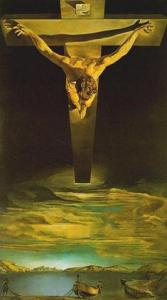
And if there is a deliverance, it is because there is slavery. We were children, but we became slaves, following the voice of the Evil One. No one else delivers us from that effective slavery except Jesus, who assumed our flesh from the Virgin Mary and died on the Cross to free us from the slavery of sin and to restore us to our forfeit filial condition. Celebration of Vespers and Te Deum of Thanksgiving for the end of the year (31 December 2014) | Francis
2015
On many occasions the Church feels the joy and the duty to raise her song to God with these words of praise, words which have accompanied her on this earthly pilgrimage since the fourth century. It is the joy of thanksgiving that emanates almost spontaneously from our prayer, by recognizing the loving presence of God throughout the course of our history. As often happens, however, we feel that, for prayer, one voice alone is not enough. It needs to be reinforced with the company of all the People of God, who in unison make their song of thanksgiving heard.
This is why in the Te Deum we ask the Angels, the Prophets and all of creation for their help in giving praise to the Lord. In this hymn we trace the history of salvation where, through God’s mysterious plan, there is also a place for the summation of the various events in the our lives this past year. Celebration of Vespers and Te Deum in Thanksgiving for the past year (31 December 2015) | Francis
2016
Today, before the little Child Jesus, we should acknowledge that we need the Lord to enlighten us, because all too often we end up being narrow-minded or prisoners of all-or-nothing attitude that would force others to conform to our own ideas. We need this light, which helps us learn from our mistakes and failed attempts in order to improve and surpass ourselves; this light born of the humble and courageous awareness of those who find the strength, time and time again, to rise up and start anew.
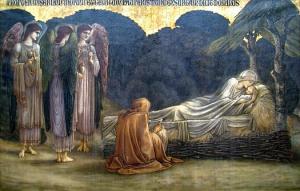
As another year draws to an end, let us pause before the manger and express our gratitude to God for all the signs of his generosity in our life and our history, seen in countless ways through the witness of those people who quietly took a risk. A gratitude that is no sterile nostalgia or empty recollection of an idealized and disembodied past, but a living memory, one that helps to generate personal and communal creativity because we know that God is with us. God is with us. Celebration of Vespers and Te Deum in Thanksgiving for the past year (31 December 2016) | Francis
2017
“When the time had fully come, God sent forth his Son” (Gal 4:4). This celebration of Vespers breathes the atmosphere of the fullness of time. Not because we are at the last evening of the solar year, far from it; but because the faith teaches us to contemplate and feel that Jesus Christ, the Word made flesh, has given fullness to worldly time and human history.
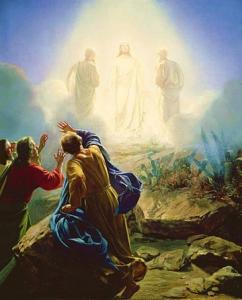
“Born of woman” (v. 4). The first to experience the meaning of the fullness given by the presence of Jesus was precisely the “woman” of whom he was “born”: the Mother of the Incarnate Son, Theotokos, Mother of God. The fullness of time flowed forth through her, so to speak: through her humble and faith-filled heart, through her flesh wholly permeated by the Holy Spirit. Celebration of Vespers and Te Deum in Thanksgiving for the past year (31 December 2017) | Francis
2018
God the Father sent his only begotten Son into the world in order to eradicate from the heart of men and women the ancient slavery of sin and thus restore to them their dignity. From the heart, as the Gospel teaches us (cf. Mk 7:21-23), come all evil intentions, the iniquities that corrupt life and relationships. And here we must pause to reflect with sadness and remorse because, also during this year which is coming to a close, so many men and women have experienced and are experiencing conditions of slavery, not worthy of human persons.
Here too in our city of Rome there are brothers and sisters who, for various reasons, find themselves in this situation. I think especially of so many people who are homeless. There are over ten thousand of them. In the winter months, their situation is especially difficult. All of them are sons and daughters of God, but various forms of slavery, sometimes quite complex, have forced them to live at the limits of human dignity. Jesus himself was born in a similar situation, though not by chance or accident. He desired to be born this way, in order to reveal the love of God for the weak and the poor, and thus to sow in the world the seeds of God’s kingdom, a kingdom of justice, love and peace, where no one is a slave, but all are brothers and sisters, children of the one Father.

The Church in Rome does not want to be indifferent to the forms of slavery today, nor simply observe them and offer assistance, but rather it wants to be immersed into this reality, close to these people and to these situations.Celebration of Vespers and Te Deum in Thanksgiving for the past year (31 December 2018) | Francis
2019
I am thinking of many brave people, believers and non-believers whom I have met over these years and who represent “the beating heart” of Rome. Truly God has never stopped changing history and the face of our city through the least and the poor people that live in it. He chooses them, inspires them, motivates them to take action, makes them supportive, spurs them to establish networks, create virtuous bonds, to build bridges, not walls. It is precisely through these thousands of rivulets of the living water of the Spirit that the Word of God fruitifies the city and, from barren, turns it into a “joyous mother of children: (Ps 113 [112]:9). And what does the Lord ask of the Church? He entrusts to us his Word and spurs us to throw ourselves into the throng, to involve ourselves in encounters and relationships with the inhabitants of the city so that his word may run swiftly.
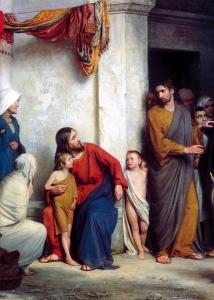
We are called to encounter the others and to listen to their life stories, their cry for help. Listening is already an act of love! Having time for others, to enter into dialogue, recognizing with a contemplative gaze the presence and action of God in their lives, to bear witness with actions more than with words to the new life of the Gospel is truly a service of love that changes reality. Indeed, thus doing, a new air circulates in our city and our church, a willingness to take up the journey again, to overcome the old mindset of opposition and fences in order to cooperate in building a more just and fraternal city together.
We must not be afraid or feel inadequate for this most important mission. Let us remember: God does not choose us because of our “goodness” but precisely because we are and we feel small. Let us thank him for his grace which has sustained us this year and let us joyfully lift a hymn of praise to him.Celebration of Vespers and Te Deum in Thanksgiving for the past year (31 December 2019) | Francis
2020
Dear Brothers and Sisters, The celebration of this feast always has a twofold aspect: with the liturgy we enter into
the Solemnity of Mary, Mother of God,
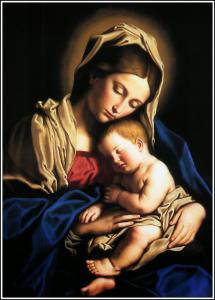
and at the same time we end the calendar year with a great hymn of praise.
The first aspect will be discussed in tomorrow’s sermon. Tonight we want to give room for thanksgiving for the year that is coming to an end.
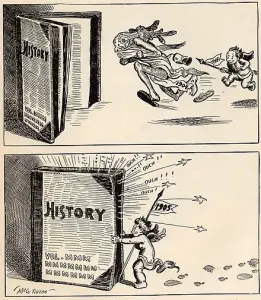
“Te Deum laudamus”. “We praise you, God, we praise you, Lord…” It might seem artificial to thank God at the end of such a year, which was marked by the pandemic. The thoughts go to the families who have lost one or more members. We think of those who were sick, who suffered from loneliness, who lost their jobs… Sometimes someone asks: What is the point of such a tragedy? We must not answer this question prematurely. Even God does not respond to our most anxious “whys” by resorting to “higher causes”. God’s response follows the path of the Incarnation, as the Antiphon of the Magnificat sings: “Out of love for us, God sent his Son in the form of the flesh”. First Vespers and Te Deum in thanksgiving for the past year (31 December 2020) | Francis
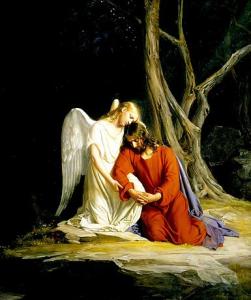
2021
In these days the Liturgy invites us to awaken in ourselves amazement, amazement at the mystery of the Incarnation. The Christmas party is perhaps the one that most awakens this inner attitude: wonder, wonder, contemplation… Like the shepherds of Bethlehem, who first received the luminous angelic announcement and then hastened to find the sign that had been indicated to them, the Child wrapped in swaddling clothes in a manger. With tears in their eyes, they kneel before the newborn Savior. But not only them, Mary and Joseph are also filled with holy amazement at what the shepherds say they have heard from the angel about the Child.
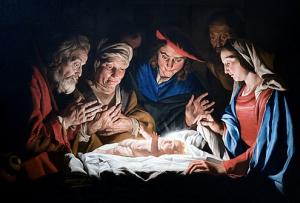
It’s true: you can’t celebrate Christmas without wonder. But an amazement that is not limited to a superficial emotion ― it is not an astonishment ― an emotion linked to the exteriority of the party, or even worse to a consumerist frenzy. No. If Christmas comes down to this, nothing will change: tomorrow will be the same as yesterday, next year will be the same as the previous one, and so on. It would mean warming ourselves for a few moments with a straw fire, and not exposing ourselves with our whole being to the force of the Event, not grasping the center of the mystery of Christ’s birth.
And the center is this: “The Word became flesh and dwelt among us”
Vespers Celebration and Te Deum of Thanksgiving (December 31, 2021) | Francis
2022
Kindness is an important aspect of the culture of dialogue, and dialogue is indispensable to live in peace, to live as brothers and sisters, who do not always agree – this is normal – but who nevertheless speak to each other, listen to each other and try to understand each other and to move toward one another. We only need to think of what the “world would be like without the patient dialogue of the many generous persons who keep families and communities together. Unlike disagreement and conflict, persistent and courageous dialogue does not make headlines, but quietly helps the world to live better” (ibid., 198). Kindness, then, is a part of dialogue. It is not only an issue of “good manners”; it is not a question of “etiquette”, of courteous behaviour…. No. This is not what we mean when speaking of kindness. Instead, it is a virtue to be retrieved and practiced every day in order to go against the tide and to humanize our societies. Celebration of Vespers and Te Deum in Thanksgiving for the past year (31 December 2022) | Francis
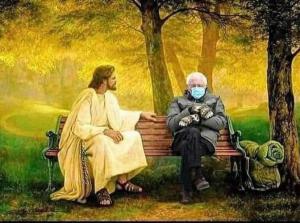
2023
Faith enables us to live this time in a different way compared to a worldly mentality. Faith in Jesus Christ, God incarnate, born of the Virgin Mary, offers a new way of feeling time and life. I would summarize it in two words: gratitude and hope.
One might say, “But isn’t this what everyone does on the last evening of the year? Everyone gives thanks, everyone hopes, believers and non-believers alike”. Perhaps it may seem that way, and if only it were! But in reality, worldly gratitude, worldly hope are evident: they lack the essential dimension that is the relationship with the Other and with others, with God and with our brethren. They are focused on the self, on its interests, and so they are very short-winded, they do not go beyond satisfaction and optimism.

Instead, in this Liturgy that culminates in the great hymn Te Deum Laudamus, one breathes an entirely different atmosphere: one of praise, of wonder, of gratitude. And this happens not because of the majesty of the Basilica, not because of the lights and the hymns — these things are, rather, the consequence — but because of the Mystery that the antiphon of the first Psalm expressed thus: “O admirable exchange: the creator of human-kind, taking on a living body, was worthy to be born of a virgin, and … has given us his deity in abundance”. This admirable exchange!
The Liturgy allows us to enter into the sentiments of the Church; and the Church, so to speak, learns them from the Virgin Mother. Celebration of Vespers and Te Deum in Thanksgiving for the past year (31 December 2023) | Francis
2024
I wanted to open the Door wide, today, here. I opened the first in San Pietro, the second is yours. It is a beautiful gesture to open wide, to open: to open the doors. But more important is what it means: it is opening your heart. Open hearts. And this is what brotherhood does. Closed hearts, hard ones, don’t help you live. For this reason, the grace of a Jubilee is to widen, open and, above all, open hearts to hope. Hope does not disappoint (see Rom 5:5), never! Think carefully about this. I think so too, because in bad moments one thinks that everything is over, that nothing can be resolved. But hope never disappoints.

I like to think of hope as the anchor that is on the shore and we are there with the rope, safe, because our hope is like the anchor on dry land (see Heb 6:17-20). Don’t lose hope. This is the message I want to give you; to everyone, to all of us. I’m the first. Everyone. Don’t lose hope. Hope never disappoints. Never. Sometimes the rope is hard and hurts our hands… but with the rope, always with the rope in our hands, looking at the shore, the anchor carries us forward. There is always something good, there is always something that keeps us going. Apertura della Porta Santa e celebrazione eucaristica nella Casa Circondariale di Rebibbia (26 dicembre 2024) | Francesco
Happy New Years Everyone
